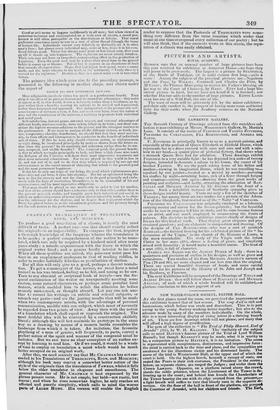CHAPMAN'S TR1NSLATION OF THEOCRITUS, DION, AND 11ICSCHUS.
To produce a good translation of a classic, is nearly the most difficult of tasks. A perfect one—one that should exactly reflect the original—is an impossibility. To compass the first, requires a thorough knowledge of the language whence the translation is to be made; a perfect comprehension of the author to be translated, which can only be acquired by a kindred mind after many years study ; a minute acquaintance with the times in which the original writer lived ; and a genius hardly inferior to his own. When all these qualities are united, the possessor must pass his time in an employment analogous to that of reading riddles, in order to render tbithfully felicities or peculiarities of diction.
But all this will only give us a good, perhaps a decent translation. To get a counterpart of the author, we must have a mind trained as his was trained, feeling as he felt, and seeing as he saw. Turn to any classical or scriptural book of travels—see the frequent exclamation of the writer on unexpectedly meeting some custom, some natural characters, or perhaps some peculiar local feature, which enabled him to relish the allusions he before scarcely understood, or thought absurd. Let any one ask another to correct his writings en subtile and refined subjects, or retouch any parts—and see the jarring results that will be made when two contemporary minds, with the advantage of personal communication, meddle with one subject, which must of necessity be regarded frotn tw o points of view. Away then with the notion of a translation which shall equal or approach the original. The most faithful idea will be conveyed by a construction skilfully literal ; although this will but resemble its prototype in the same way as a drawing by means of a camera lucida resembles the landscape from which it is taken. An imitation, the favourite plaything of a man of genius, will frequently, in parts, convey a perfect notion of the spirit and manner of the congenial mind he Imitates. But we can have no clear conception of an author except by learning to read. him. Or if we could, it would be a waste of time to employ on translation a mind which would be much better occupied on an original work. After this, we need scarcely say that Mr. CHAPMAN has not succeeded in his Translations of THEocatirus, BION, and Moscuus; although his book may convey a somewhat better notion of the style of the originals than the translation of FAwxEs, whilst it falls below the older translator in elegance and smoothness. The general character of Mr. CHAPMAN is best expressed by the phrase prosaic verse. He is not simple, but bald—not rustic, but coarse; and when he rises somewhat higher, he only reaches an affected and puerile simplicity, which calls to mind the worser parts of LEIGH RUNT. His version will enable the English reader to suppose that the Pastorals of THEOCRITUS were something very different from the tame inanities which under that name at one time overspread every collection of our poetry ; but he will also think, that if the ancients wrote in this strain, the reputation of a classic was easily obtained.


























 Previous page
Previous page